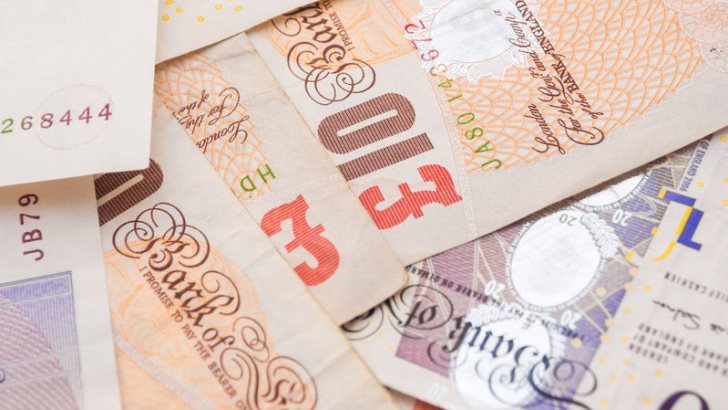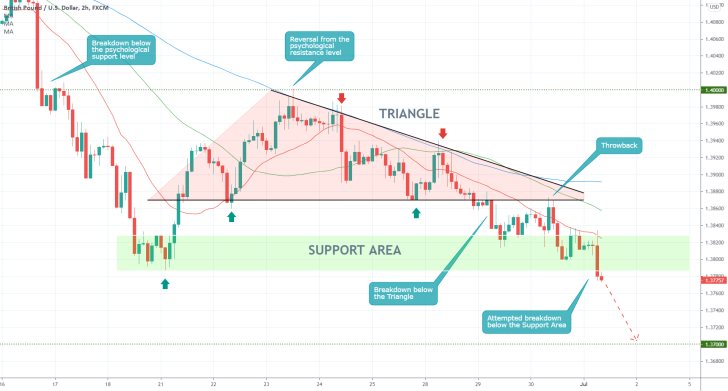
The GBPUSD pair remains pressured by the strengthening of the U.S. dollar. To understand why the GBPUSD is tumbling down, check out our latest comprehensive analysis of the cable.
Andrew Bailey, Governor of Bank of England, commented on the supply bottlenecks that are currently underpinning the economic recovery in the U.K. He views these short term supply gluts as primary drivers of the temporary inflation spikes. This catalysed further selloff on the GBPUSD today.

As can be seen on the 2H chart above, the price action broke down below the Support Area (in green) following Bailey's remarks, which underscores the strong bearish sentiment in the market.
This happened shortly after the price had already broken down below the lower boundary of the major Triangle pattern.
What is even more demonstrative of the robust selling pressure in the short term is the fact that the price action remains concentrated below the 20-day MA (in red), which is positioned below the 50-day MA (in green). The 100-day MA (in blue), in turn, is currently threading above all of the other moving averages.
This perfect descending order is illustrative of the prevailing selling pressure in the short term. In all likelihood, the currently strengthening dollar is likely to continue sending the GBPUSD tumbling down.
Unconventional Recovery
In his policy statement, Andrew Bailey adopted a similar stance to the one of Jerome Powell, Chair of the FED. In suggesting that inflation is temporary, the Governor of BOE emphasised on the rapidly changing economic conditions that have caused the aforementioned supply bottlenecks in the first place.
"Where the recovery in demand outstrips supply, it is entirely possible that we will witness temporary periods of excess demand, or what more commonly we might describe as “bottlenecks”. This is especially likely within particular sectors, given the uneven nature of the recovery. […] additional price pressures can arise from the various shortages caused by imbalances in the recovery of supply and demand, as the latter recovers more rapidly than the former. But these imbalances should not last."
Covid has not had the same impact on our economy as other shocks did in the past, says Andrew Bailey.
— Bank of England (@bankofengland) July 1, 2021
We expect the cost of living to go up in the coming months, but that should be short-lived. We shouldn’t over-react to temporary higher inflation. https://t.co/ppe2uCBTTk pic.twitter.com/quBo6V8X2K
Trendsharks Premium
Gold is undergoing a correction, as investors take profits to offset losses from falling stock prices, impacting their margins. However, we anticipate a renewed wave of [...]
The Swiss stock market index is mirroring its global counterparts, such as Germany 40 and US100, experiencing a sharp decline following the announcement of new [...]
We’re analyzing the weekly chart to grasp the broader market trend. Over the past three years, the US30 index has surged by 17,000 points, often resembling a nearly straight [...]
Over the past week, the DAX has experienced a sharp decline, plunging by an astonishing 3,400 points. This downward movement is not isolated, as its international counterparts, such as the UK100 and US100, are also facing significant [...]
EURUSD recently formed a double top at 1.0930, signaling a potential trend reversal, and has since begun a correction. After a 600-pip rally since early March, a pullback at this stage is both expected and healthy. Given these conditions, we are placing a [...]
Since early March, EURJPY has surged nearly 1,000 pips, providing us with several excellent trading opportunities. However, as the rally matures, many early buyers are beginning to take profits, leading to a noticeable slowdown in the uptrend. On Friday, the pair formed a [...]
The AUDJPY currency pair continues to be dominated by bullish momentum, as multiple golden cross patterns reaffirm the strength of the ongoing uptrend. Despite this, we are witnessing a much-needed [...]
The EURAUD currency pair appears to be undergoing a trend reversal, signaling a potential shift in market direction. A notable technical development is the formation of a Death Cross on the chart, a widely recognized bearish indicator that typically suggests a [...]
After securing an impressive 200-pip profit last week, the EURJPY currency pair is now undergoing a southward correction, retracing some of its recent gains. Despite this temporary pullback, the Golden Cross remains intact, reinforcing our view that the overall trend continues to be [...]
The appearance of a Golden Cross in Silver strengthens our analysis that the metal is currently in a strong uptrend, indicating further bullish momentum in the market. This technical pattern, where the short-term moving average crosses above the [...]
This trade presents a considerable level of risk and can be classified as an opportunistic move based on recent price action. The GBPUSD currency pair has experienced a substantial bullish rally, surging by nearly 500 pips in a strong upward movement. However, after this extended period of appreciation, the pair is showing signs of a potential [...]
The anticipated Death Cross on the SMI20 appears to be failing as price finds strong support at the 23% Fibonacci retracement level. After testing this area, the index has shown bullish strength, printing several large green candles, signaling an increase in [...]
A Golden Cross has just appeared on the USDJPY chart, signaling a potential bullish move. This technical pattern occurs when the 20 period moving average crosses above the 60 period moving average, a widely recognized indication of increasing [...]
After 2 months of a down trend, we finally see some indications of price recovery for Oil. The golden cross, a historic buy signal, supports this [...]
For the past month, the German DAX40 has experienced a remarkable 10% surge, reflecting strong bullish momentum. Despite ongoing market volatility and frequent pullbacks, every dip continues to attract fresh buyers, reinforcing the [...]
Oil continues its downward trajectory, despite occasional pullbacks. The overall trend remains bearish, reinforced by multiple Death Cross patterns, a classic sell signal indicating further weakness. Adding to this bearish outlook, the critical [...]
Over the past few days, gold has experienced a sharp decline of more than $100. This downturn can be attributed in part to traders securing profits to manage their margins, which are under strain due to the significant drop in major indices. Currently, gold has fallen below the [...]
The NASDAQ 100 index is showing strong bullish momentum, as evidenced by the formation of a Golden Cross on the chart. This classic buy signal occurs when the short moving average crosses above the long term moving average, suggesting that upward momentum is [...]
The EURAUD currency pair has encountered a significant resistance level, failing to break above the critical 61% Fibonacci retracement level. This suggests that bullish momentum is weakening, reinforcing the case for a potential downward move. Given this technical setup, we favor entering a [...]
The UK100 is experiencing a remarkable rally! Over the past few weeks, the British stock market index has surged nearly 800 points. Each minor dip has attracted more buyers, fueling the bullish momentum. However, since last week, we’ve observed a slight [...]




















